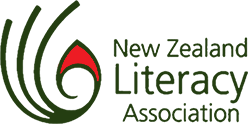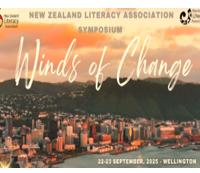NZLA Literacy Forum Editors Report to the Annual Meeting 2019/2020 – Mal Thompson
Click here for a PDF copy Report of the Editor of Literacy Forum NZ to the 2020 Annual Meeting of the New Zealand Literacy Association
Report of the Editor of Literacy Forum NZ to the 2020 Annual Meeting of the New Zealand Literacy Association
Three issues of Literacy Forum NZwere produced in 2019. The first issue was prepared by the Manawatu Literacy Association, led by Sarah McCord. The conference theme was “Literacy Landscapes”, where
keynote presentations had a focus on literacy, such as neurological development, self-extending systems, e-learning, interventions, Pasifika success and more. Keynote speakers included Peter Johnston, Janet Gaffney, Nathan Mikaere Wallis, Rae Si’ilata, Suzie Johnston, Donovan Bixley, Rob Southam Bernadette Dwyer and Wayne Mills.
Dr Peter Johnson spoke about engagement, self-regulation and the choices we make in the use of language which all lead to effective literacy development. Mirroring students’ experiences in today’s digital world was emphasized by Dr Bernadette Dwyer, encouraging us to reach out and connect with students. Suzie Johnston delighted us with her presentation, causing much laughter, and the day finished with Lit Quiz Master, Wayne Mills as he had all competing against each other.
Day Two started with Professor Janet Gaffney’s presentation, urging us to reflect on our own practice and question our approaches to our learners. Rob Southam did not disappoint with her reviews of newly published books and also her old favourites. Author symposiums which included Gavin Bishop, Des Hunt, Sally Sutton, David Hill, Kate de Goldi and David Riley were well received by delegates. The authors shared insights into what inspired them to write. Day 2 finished with a night of wearable arts and Japanese drummers at the Te Manawa venue in Palmerston North. The final day began with Dr Rae Si’ilata who gave a moving presentation on Pasifika success, and also challenges Pasifika children faced in their education journey. Donovan Bixley talked about how he created and developed his ideas and books. Finally, Nathan Wallis helped delegates understand the changes that students’ brains go through as they grow, and how we can support them.
This was a conference packed with outstanding speakers and workshops and lots of energy had gone into making this a landscape not to be missed. This ‘meaty’ issue of Literacy Forum NZpublished contributions by some of the keynote speakers and also included book reviews and reports from Southland and Waikato councils.
The second issue, complete with colourful cover of storyteller, Tanya Batt, was produced with help from the Tauranga Literacy Association.
An oldie but a goodie article, “Reading with a Writer’s Eye” by Ruth Culham led another good issue. Contributions from Candy Hollier (teacher and Masters’ student) with Wendy Carss, focused on the teacher as a writer. Tanya Batt delighted with her storyteller’s piece “Making Sense of Stories”. Tessa Duder reported on the Storylines National Festival Story Tour – an interesting account of 24 leading writers and illustrators who tour schools, libraries, early childhood centres and community groups in six regional centres from May to November each year. I look forward to the next tour in the Otago region. Libby Limbrick brought to our attention the books for refugee children in their home languages, which highlights the partnership between Storylines and the Mangere Refugee Centre. Carla McNeil talked about teaching reading. A new publication, “Children’s Literature in a multi-literate world” by Nicola Daly, Libby Limbrick and advisory editor Pam Dix was reviewed: this is a book you should read!
The issue included more book reviews and news from Auckland, Taranaki, Waiariki and Wellington Councils. Thank you all.
The third and final issue for 2019 was produced by Taranaki Literacy Association, and helped by Southland Literacy Association. Heather McQuillan exposed some of the myths that frame the teaching of writing. Effective practice in the teaching of writing and the fundamental part that explicit instruction plays in the process was explored by Jo Francis-Alles. Nicky Tapp wrote about developing successful transitions from early childhood to school which involved whanaungatanga and links between Te Whariki and the NZ Curriculum. Another interesting piece was Sarah Whiting’s on transforming literacy through play. Prue Langbein reported on her work recording audio items from children, aged 5-12. Lastly, a timely contribution came from Dr Susan Sandretto who wrote about ‘fake news’.
In this last issue for 2019, we also featured a report from Southland Literacy Association on their literacy symposium, and a notice promoting the NZLA conference in New Plymouth (Mai Te Maunga Ki Te Moana) which had to be cancelled. Jackie Cameron, a retired teacher/ now librarian wrote a piece “Welcome to our literary world” and Heather Bell reported on the 2019 ILA conference in New Orleans. Such a fantastic array of reading in this issue (as well as over the three issues this year) which ended with council reports from Auckland, Manawatu, Otago, Tai Tokerau, and Waikato.
Thank you to all who contributed over the year or helped with the production of these issues.
It is good to see the range of articles still coming in for publication and special mentions of our amazing members as well as book reviews, travel and conference reports, and councils reporting on events. This year 9 councils sent in at least one report. As in previous reports, I advocate that we move our journals fully online to reduce the cost of producing a print copy.
MCLT recipients, research fellows must continue to submit reports, as it is a condition of both awards. This year we have published a few from last year.
From Issue 3, 2020 there will be a new editor as I am stepping down. I have enjoyed my time as Editor but it will give new life to our journal with fresh ideas for its presentation. I welcome Dr Stephanie Dix from the Waikato region to the position as Editor.
I thank you, the councils, for your support of Literacy Forum NZand urge you to continue to help with an article, a report or account of an aspect of literacy learning. Photos of any event or special features such as awards are gladly received.
Ka kite ano
Dr Mal Thompson
Retiring editor
Literacy Forum NZ





